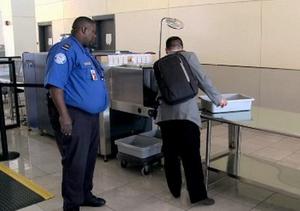Airport securityNew bill to allow more private screeners at airports
Private security companies could soon be taking over passenger screening at U.S. airports thanks to recently passed legislation that has cleared both the Senate and the House; the proposed law would require that the Transportation Security Administration (TSA) allow airports to switch to private contractors unless it can demonstrate that the move is not cost-effective and hinders security

Private screener inspecting passenger's carryon belongs // Source: jaunted.com
Private security companies could soon be taking over passenger screening at U.S. airports thanks to recently passed legislation that has cleared both the Senate and the House.
The proposed law would require that the Transportation Security Administration (TSA) allow airports to switch to private contractors unless it can demonstrate that the move is not cost-effective and hinders security.
The bill comes in the wake of loud criticism against the TSA’s screening practices and a growing chorus of legislators has called for the TSA to allow more airports to hire private security screeners. A small handful of U.S. airports rely on private contractors, but last year TSA Administrator John Pistole froze all approvals for applications to use non-TSA screeners.
“They’ve been trying to force the door open for several years,” said Jeff Price, an aviation security consultant. “It reverses the burden of proof. It is definitely trying to checkmate the TSA.”
Critics of the bill including Senator Joe Lieberman (I – Connecticut), the chair of the Senate Homeland Security Committee, have blasted the bill arguing that it does nothing to reduce costs, weakens security, and would do nothing to stop the pat downs that have angered lawmakers and the public.
“At stake is TSA’s management of the Screening Partnership Program (SPP), which allows a limited number of airports around the country to replace Transportation Security Officers (TSO) with private contractors to screen passengers and their baggage,” Senator Lieberman said in the hours before the bill’s passage. “It is telling that TSA’s assessment after comparing the two systems is that it can secure airports more economically than private screeners can.”
Lieberman went on to say that he found the House and Senate’s support of the bill “regrettable” and that proposed law would ultimately “undermine the TSA— and therefore airport security itself — by advocating for the pre-9/11 system of screening by private contractors. My response to that is: how quickly we forget.”
“I know it is fashionable in some quarters to criticize TSA,” he said. “Understandably, people are unhappy with pat-downs, body scans, and invasions of privacy. But TSA establishes its policies for a reason. They are a direct response to real terrorist threats.”
“Right now, airports must demonstrate that a private screening workforce would be more effective, secure, and efficient, than the TSA,” Lieberman added. “The standard tucked into this bill, however, ‘would only require airports to demonstrate that using private screeners would not compromise security or detrimentally affect the cost-efficiency or the effectiveness of screening.’”
In defense of the bill, Representative John Mica (R – Florida), the chair of the House Transportation Committee and the sponsor of the House version of the bill, has repeatedly insisted that private screeners are more effective, save money, and would provide better service.
Mica said, rather than focusing on passenger screening, TSA should devote its resources on gathering intelligence and security oversight.
